- Home
- Annie Proulx
That Old Ace in the Hole Page 5
That Old Ace in the Hole Read online
Page 5
4
THE EVIL FAT BOY
In every installment of life’s book, Bob Dollar knew, even when he was fourteen, there was a fat boy; someone’s brother or school pal, the son of a deli owner, a youth aiming his life at building a low-rider, a discontent slagged out on some sofa with a can of Yoo-Hoo in hand, the one member of the gang the police catch, the fountain of knowledge at the porno video shop, the champion pizza maker at Benny’s Underground Pie Parlor. He encountered his fat boy in Walgreens while waiting in line for one of his uncle’s pain prescriptions. In front of him stood a suety person of sixteen, his round head bound in a black cloth imprinted with skulls and crossbones, his chin decorated with seventy or eighty pale blond whiskers and an assortment of pimples. He was wearing overalls with enormous legs—each large enough to contain a burly man—standing sidewise in line and addressing a pregnant woman waiting on a plastic chair. His sweatshirt sleeves were so long he had torn little holes at the cuff seams and from these holes his thumbs protruded, the cuffs themselves like fingerless mitts over his warty hands. He was not like other fat boys. He was not jolly, he did not smile appeasingly, his eyes were not naïve and innocent. Bob Dollar knew instinctively that this was an evil fat boy. At once he took an ardent liking to him. He liked the fat boy because he was unlikable.
The fat boy spoke to the woman on the chair. “They had me in a wrestle hold in Kansas City. It was one of the most dangerous holds. They almost killed me. I don’t know how I escaped, but I’m standing here, ain’t I, waiting in line like anybody else? And that was last year. They couldn’t do it now, because I’d kill them. I’d break their backs. And one of them was my best friend. But he is not my best friend now. He’s my ex–best friend. We did some things together. One time when we were little we borrowed his mother’s crème brûlée torch and melted the gumball machine, and the gumballs all came out on the floor, and they were rolling around and we picked them up and man, they were hot. Worse than hot, they were boiling, they stuck to our hands and burned them. See, I got gumball scars right here.” He held out his palm for inspection, displaying puckered circles.
“That was my ex–best friend Mark who built a rocket launcher when he was thirteen. He was into wrecking things, me too, and that’s probably why we were best friends. His aunt had all these old vinyl records, weird jazz stuff, and we threw them in the air and then bashed them with baseball bats. Mark had three baseball bats but he never played baseball, just bashed things. If I saw him now I would bash him. But he’s safe, he’s safe because he’s in Kansas City and I’m here. And he plays the guitar but he’s not very good. He doesn’t want to be good. He wants to be loud. And he’s got like these weird metal gloves that his grandfather gave him. His grandfather went to England to see the Tower of London and he brought back these metal gloves and Mark put them on and got his hand stuck in one. They had to take him to the emergency room in Kansas City and he was on television getting it taken off. The reason his grandfather gave him the gloves was to keep him from playing the guitar. That was the deal, ‘I give you these English metal gloves and you not play that fucking guitar.’ Excuse me, miss, that was Mark’s grandfather talking, not me.”
The woman on the chair stared at him with an expression of distaste but said nothing. Bob wanted to say that his uncle’s roommate had been put off a plane in Kansas City but as he opened his mouth the druggist, with great heavy eyes which Bob thought sensual, came to the counter and spoke to the fat boy.
“Orlando, did Dr. Tungsten give you some samples? I can’t fill your prescription. The doctor didn’t sign it.”
“What? No, he didn’t give me samples! Just the prescription and he said, ‘Get it filled right away.’ He didn’t sign it? What a jerk.”
“Do you want me to call him?”
“Hell no, I’m going back over there,” said Orlando, taking the prescription from her hand and heading briskly for the door.
When he was out of sight the clerk dialed the telephone and spoke to someone. “This is Ruby Voltaire, the pharmacist down at Young’s? I had an Orlando Bunnel, claims to be a patient of Dr. Tungsten’s, in here just now with a prescription for Viacomdex but it wasn’t signed. So I’m not sure what the story is. Oh? Uh-huh. O.K. O.K.”
The other clerk looked at Bob Dollar and said, “Your uncle’s prescription is ready.”
“He wants you to put it on his bill.” He took the container and sprinted for the door.
In grade school he had had friends, but his freshman year in high school was one of oppression, loneliness and a sense of being an outcast, in part, he was sure, because he wore cast-off garments from Uncle Tam’s shop. A month into his sophomore year he tried to explain the situation to his uncle.
“I didn’t make many friends last year,” he said, “but I thought it was because I was a freshman. And I thought it would be different this year. But I am still out of it. I try to be nice to everybody but nobody is nice to me. I just don’t know how to make people like me. And they make fun of my clothes.”
But Uncle Tam was not helpful. “Aw, what do you care? They’re just punks.”
After Orlando’s advent Bob did not care.
He could see the fat boy at the bus stop two blocks west. He looked up the street and in the distance saw the flat face of the bus, no larger than the eraser at the end of a pencil. He began to run toward the bus stop, made it with the bus still blocks away.
“Hi,” he said to the fat boy, who looked at him hard.
“You were in the drugstore,” he said.
“Yeah.”
They said nothing more until they were on the bus.
“Where do you go to school?” asked Bob Dollar.
“School! I don’t honor them with my presence. I fucking quit school.”
“Wow. Your parents let you quit?”
“Of course they let me quit. The alternative was handcuffs and forcible transport. I had a problem with the teachers. My parents don’t care as long as I read a lot of books.”
Bob Dollar could believe that the fat boy had problems with his teachers. He could see the potential for arousing teacher fury. “So what happened? You just didn’t go in one day? You just said to your family, ‘I have quit’?”
“O.K., here’s what happened.” Orlando spoke in a weary voice as though harried beyond bearing. “In this school I was in a class. The teacher’s name was Miss Termino. We called her ‘the Terminator.’ And ‘the Termite.’ She assigned this dumb-ass paper, ‘What I Plan to Do with My Life.’ Everybody had to read his little masterpiece in class. It was the usual dumb shit, kids who wanted to be computer programmers, software entrepreneurs, doctors and nurses, motorcycle racers, deejays.”
He had touched on a subject that greatly interested Bob.
“How do they know?” he said. “How do they know what they want to be?”
But Orlando avoided philosophical discussion and continued his story.
“So, everybody reads their little paper except me and then the Terminator says, ‘That was excellent, class.’ She didn’t mention that nobody said they wanted to be a scientist or a mathematician, which everybody knows is what’s wrong with the country. One of the things wrong with the country. So I said, ‘Miss Termino, I didn’t read mine. You skipped me.’ And she said, ‘I didn’t skip you, Orlando, I assumed you would not have done the assignment, as usual.’ So I go, ‘I did this one,’ and I got up and walked to the front. Kind of stamping. And I read my paper. I knew it by heart. I go: ‘Orlando’s Ice City. I do not want to be a brain surgeon or president, I wouldn’t mind being a champion wrestler or a guy who raises pit bulls or the captain of an ocean liner but first I am going to build an ice city at the South Pole and I’ll get money from big corporations and hire a bunch of guys with no jobs—clean up the bums in Kansas City—to build the ice city. The buildings will all be clear ice and I’ll have a big furnace to melt snow and squirt the water into molds—rectangles cubes cones and cylinders—and the bums will put them toge
ther into big ice skyscrapers and domes and I’ll have all these lights inside so the ice buildings at night will shine in colors and the best and biggest buildings will be huge tetragons, and if people want to tour the city I’d charge fifty dollars each and that would include penguin steaks for dinner.’ So then a girl goes, ‘Penguin steaks! Agk! Gross!’ and I gave her a shove because it was proof of a closed mind and penguin steaks are probably pretty good, but the girl fell on her desk and broke her teeth off just like a hockey player and the Terminator said go to the office. I said not a word but picked up my books and walked. Quit. My father—he’s a jerk but so what—sided with me. Then two weeks later we moved here.”
“I guess you got a good imagination or you’re a big liar,” said Bob Dollar.
“Well, that’s for you to find out.” Orlando hung from the strap so his body swayed with the bus’s motion.
Bob said, “I don’t get how people know what they want to be before they’re old, like twenty or something.”
“You don’t have a clue?”
“No. Do you? I mean, after building the ice city.”
“Sure. I want to be rich and rule the world. I want to be a computer geek. And I don’t want to build the fucking ice city no more. That was kid stuff. Why you want to know about quitting school? You planning on doing that?”
“No. My uncle wouldn’t let me.”
“What does he have to do with it? What about your parents?”
“They disappeared when I was seven.”
“Holy shit! What do you mean, disappeared? Ran off in the night? Abducted by aliens? Exploded? Killed by gangsters or venomous reptiles? Man, I am impressed. I wish my parents would disappear. My mother—know what she does?”
“What?”
“She cooks stuff with the labels on. Those dumb stickers they put on the tomatoes saying ‘tomato’ or the avocados saying ‘avocado’? She forgets to take them off so you find these little labels in the salad. Or the chicken’s got this metal tag on its wing and she cooks it with the tag on and there’s lead and all kinds of poison comes out of the metal. So I’m half-poisoned. My father suffers the worst. He’s all bent over and coughing. Poisoned by metal chicken labels.”
The bus was filling up and Bob stood closer to Orlando. He could smell dirty hair and spearmint chewing gum.
“My mother and father went to Alaska to build a cabin for us to live in and I got to stay with my uncle until they came back. Except they never did. Never called up, never wrote. My uncle called the Alaska police and they put out a missing-persons report but they never found them. My uncle Xylo went to Alaska to look for them. Somehow they just disappeared. Couldn’t ever find out what part of Alaska they went to. So I got to stay with my uncle forever. He runs a junk shop on Colfax and we live in the back and upstairs. At first my uncle thought something had happened to them. But later he changed his mind. I think he figured out that they dumped me.”
“Man, that is weird! So are you going to go to Alaska and search for your parents when you turn eighteen?”
“I thought about it.” He had never told his uncle this deep fantasy that had started a few months after they disappeared: he imagined himself flying to Fairbanks, looking in the phone book and finding Adam and Viola Dollar with an address and telephone number. Later, after he found out that Fairbanks was just another ordinary city, he had amended the scenario: now he (metamorphosed into a hirsute and muscular adult) paddled a red canoe up a raging Alaskan river, and then hiked into the wilderness as winter was coming on. Just when he was on the verge of freezing in a terrific blizzard he came upon a cabin in the wilderness. Inside was an old couple, feeble and emaciated. Their fire was out and they huddled under ragged blankets. He found the axe and the woodshed and chopped great armfuls of wood, made a fire, cooked hot dogs and mashed potatoes, fed the old couple, who sobbed with gratitude, and then he washed the dishes. There was a dog—a husky—and he fed the dog. Later he enlarged the husky to a whole pack of starving sled dogs and he fed them all and they licked his hands. The old couple exclaimed over him and when they were strong again they begged him to stay. The old man said, “We had a boy who would have been about your age but we were never able to go back to Denver and get him.” And he imagined himself gently asking why and being told of a desperado—Rick Moomaw, with bushy hair and a face like a whiskered hot water bottle—on the neighboring claim, who was waiting for them to leave, even for a weekend, when he would manage to steal their entire property, even the cabin, even the deed. Finally Bob told them who he was, their long-lost son, and they fell on his neck and told him they had found gold but Rick Moomaw was after their claim. In the fantasy he laughed and flexed his arms, said he could and would break Moomaw into pieces.
Later this fantasy faded, replaced by dreams of sluttish blonds with enameled toenails, but when he met the fat boy it was still blazing. He had never told anyone about his hope to find his parents, yet within a few minutes of their meeting Orlando had guessed it.
A few months after his parents’ fateful departure Bob had started thinking of his slippery self as a reindeer, and he carried his head carefully to avoid hitting his antlers against cupboards or wall projections. It became an intensely vivid fantasy. He had no idea who he was, as his parents had taken his identity with them to Alaska. The world was on casters, rolling away as he was about to step into it. He knew he had a solitary heart for he had no sense of belonging anywhere. Uncle Tam’s house and shop were way stations where he waited for the meaningful connection, the event or person who would show him who he was. At some point he would metamorphose from a secret reindeer to human being, somehow reconnected with his family.
At Christmas he went with Uncle Tam, but not Bromo, who stayed behind to feed the cat and look after the shop, to Knuckle, Kansas, the family farm where his mother, Uncle Tam and the rest of the Bapp siblings had grown up. He had stayed with his grandmother many times when he was still with his parents, and saw now that even when he was very young his mother and father had not wanted him. At the holiday gatherings his aunts Lutie and Banjie made much of him and his uncles squeezed out false promises to take him fishing or hunting or to a Rockies game. At some time during the dinner his grandmother would look around the table, wipe at her eyes and say, “If Viola knew what she was missing.”
“I’m sure she took it into consideration and regrets her decision, Mother,” said Uncle Ket, for the extended family had theories that Viola and Adam Dollar were living somewhere in Homer or Nome, or even raising foxes in the Aleutians. Over the years the family had advanced explanations for the long silence, all built on the supposition that the runaways were not dead: leprosy, amnesia, madness, kidnapping or retreat to a very remote place could explain why they had not been in touch. Bob clung to these scenarios. Only Bromo Redpoll said they were dead, and what did he know? He was not blood kin.
On the bus Orlando suddenly said, “Hey, you want to go to the movies?”
“Yeah, but I got to get my uncle’s prescription back to him. He’s waiting for these pills. He said he was in agony. He hurt his back lifting a box of plastic dolls. Plus his feet really hurt.”
“Bad! Where do you live?”
“Colfax. Way out on Colfax, out near Chambers Road. It’s like almost to Kansas.”
“Man, that’s way, way, way out there. Can we get there on the bus? Cool. We take the pills to your uncle and then we go. The theatre is on Colfax too. The Cliff Edge, Colfax and Xerxes. It’s behind a liquor store.”
“I thought you had to go back to your doctor.”
“Doctor? What do you mean?”
“What you told the drugstore lady. That you were going back to get your prescription signed.”
“Oh, that was just bullshit. I was just trying it on. That was straight from the Book of Never Happen. I found that prescription on the sidewalk. Let me see your uncle’s pills. Heh. Hydrocodone. No rush there, that’s just codeine and Tylenol. But we might as well take a couple. He’ll never miss them.�
�� He shook out six pills, gave two to Bob, swallowed the others.
Bob Dollar put the pills in his jacket pocket. “O.K.,” he said, “what’s the movie?”
“Rat Women. It’s great. It’s like this weird black-and-white flick, all grainy. It’ll scare the shit out of you. It’s an old horror movie from the sixties. That’s all the Cliff Edge shows is horror and kinky stuff. Hey, don’t we get off here? To change buses?”
Up Colfax they went, sliding past the Satire Lounge, PS Greek Pizza, past John Elway’s Parts and Tammy’s Nails, Air Afrik, Dragon Express and The Bomb. There was a fistfight going on in front of the Space-Age Atomic Washeteria, and Bob told Orlando that Uncle Tam’s budgie had come from Jersey John’s Pet Shop and that they had a charge account at the Mad Dog and Pilgrim bookstore where Bob was allowed to charge two books a month. (Bob had gone often to the branch library until Uncle Tam forbade him, for he had trouble returning the books on time and the library fines mounted up.) Orlando did not seem impressed. Finally they were past Food 99 and the Brigadier Army Surplus and there was Uncle Tam’s shop, Used but Not Abused, and Bob felt a rush of embarrassment that it all looked so shabby and poor.
Uncle Tam was lying on the ratty sofa, drinking beer and watching television. He took the brown plastic container and shook out two large capsules, swallowed them with a mouthful of beer.
“So, you want to go to a movie?” he said. “Is it a good one? Maybe I’d come with you if my back wasn’t killing me.”
“You might not like it, sir,” said Orlando. “It’s an old horror film. Rat Women.”
“Well, no, that’s not my cup of tea. So I guess I’m not sorry.” (He had watched Jacques Tati in Mon Oncle thirty-seven times for the sake of the scene in the plastic factory, the red hose emerging with swollen bladders or pinching down into a string of shining plastic sausages.) He dug a dollar bill out of his pocket.

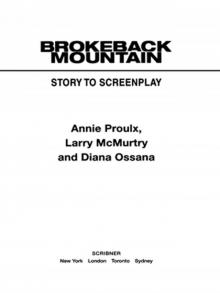 Brokeback Mountain
Brokeback Mountain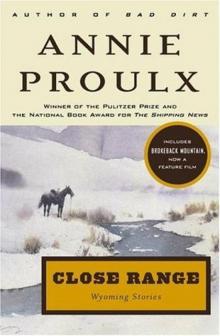 Close Range
Close Range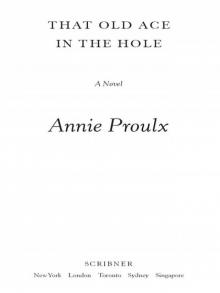 That Old Ace in the Hole
That Old Ace in the Hole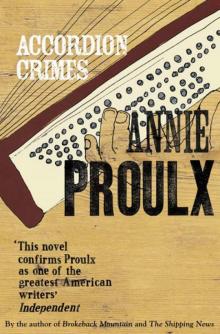 Accordion Crimes
Accordion Crimes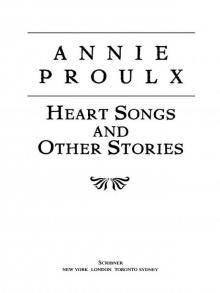 Heart Songs and Other Stories
Heart Songs and Other Stories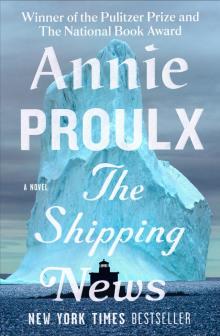 The Shipping News
The Shipping News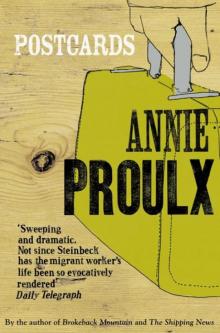 Postcards
Postcards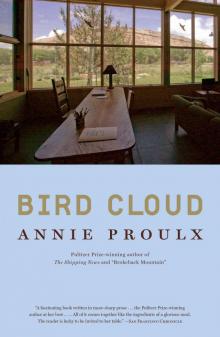 Bird Cloud
Bird Cloud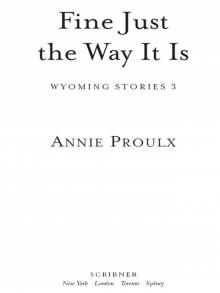 Fine Just the Way It Is
Fine Just the Way It Is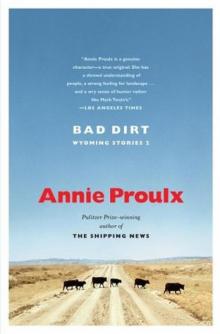 Bad Dirt
Bad Dirt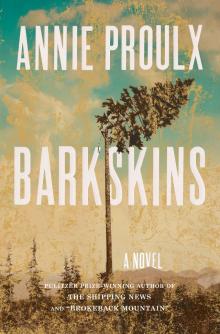 Barkskins
Barkskins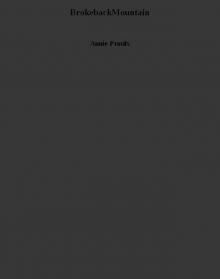 BrokebackMountain
BrokebackMountain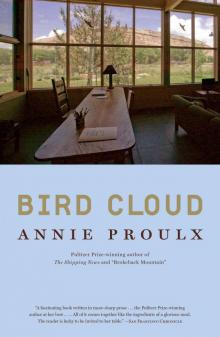 Bird Cloud: A Memoir of Place
Bird Cloud: A Memoir of Place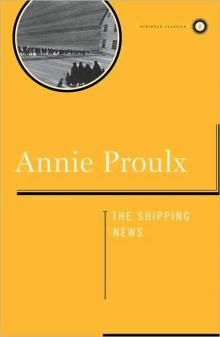 Shipping News_A Novel
Shipping News_A Novel